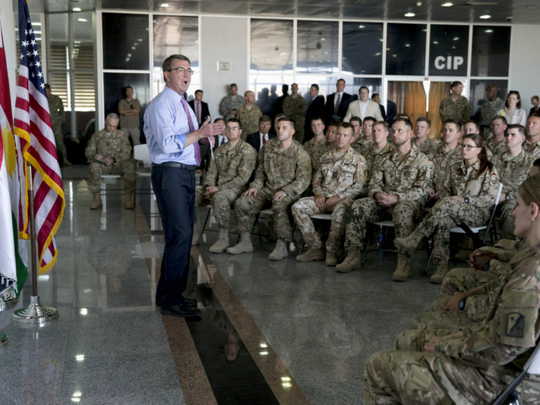
There have been conflicting theories and views about the origins of Daesh (the self-proclaimed Islamic State of Iraq and the Levant) and those responsible for its expansion after the terrorist organisation imposed itself firmly in the Middle Eastern political arena.
Trying to find out who benefits most from Daesh’s activities is an ordeal; it is a difficult question to answer, as there are quite a few skilled actors at play in the region.
In this context, there are accusations directed towards many countries: On February 19, US President Barack Obama said that “the sectarian politics of the former Iraqi prime minister Nouri Al Maliki and Syrian President Bashar Al Assad contributed to fomenting violence in their countries and the emergence of Daesh”.
In turn, Iraqi and Syrian officials blamed the US and more than one country in the region for the emergence of this organisation and pointed at their support and sponsorship.
Inside the US, accusations are exchanged between Republicans and Democrats about the failure to limit Daesh’s influence and expansion, especially after the fall of Ramadi, the capital of Anbar province in Iraq, and given the fact that the US and Iraq are bound together in a security agreement for strategic cooperation.
Those accusations are not new and were never subtle; they were not taken seriously because they were interpreted as being part of the bickering that usually takes place as the US presidential elections draw closer.
But when the same accusations are made by General Ray Odierno, US Army Chief of Staff, it is another matter altogether.
The US general is not party to political quarrelling; he is aware of the situation on the ground and is also briefed on the exact details because he served as the commanding general of US forces in Iraq for four years.
The media is usually interested in political statements made by politicians even if these statements are insignificant. However, General Odierno’s remarks were powerful and important, especially given the fact that he holds an important military position in the US.
In an interview with Fox News on June 22, he said: “The US would have been able to prevent the establishment of Daesh fundamentally if it had maintained its effective existence in Iraq and listened to the experts and their expectations.”
Here, General Odierno explicitly acknowledged that the Obama administration had ignored the advice of experts and listened only to the advice of those whose ideas were in line with the prevalent mood in the administration.
Odierno has made statements on different occasions that troubled and angered some in Iraq and the US.
In 2009 he expressed his concern and warned against concentrating on Afghanistan and forgetting about Iraq. He also cautioned against rushing to withdraw from Iraq and spoke of the need to maintain 30,000 to 35,000 soldiers after the end of 2011. But his recommendations went unheeded.
The truth is that General Odierno is not the only military official who opposed or had reservations about the US withdrawal from Iraq; for amongst the senior officials who demanded that Washington keep no less than 8,000 US troops in Iraq was former defence secretary Leon Panetta.
And although General Odierno’s statements come in the context of accusations against the Obama administration — about its weakness and non-confrontational approach, whether in Iraq or in other parts of the world — they highlight the lack of trust among senior members of the US military in the new strategy developed by the Obama administration in 2012, which is to be implemented by the beginning of 2016. This is because it weakens the capacity of the US to tackle the growing challenges — Russia, the rise of China and regional powers in the Middle East.
According to Obama’s strategy, the number of US troops will be reduced to 420,000; this force will be capable of achieving victory in one major war and deterring the enemy in a second conflict.
This, in fact, is a decline in US military capabilities and a strategic move away from what has been in place for a long time, wherein America forces were able to achieve victory in two separate wars at the same time.
In fact, the “influential existence” that General Odierno talked about can be understood in different ways, since we cannot assume that the intention is to maintain American forces for a longer period of time and not withdraw hastily.
In fact, the “influential existence” is related to a significant political role in current events, and not being content to be just an observer in Iraq while others harvest the gains of the toppling of former president Saddam Hussain.
General Ray Odierno is right in his view that since the Obama administration came to power, it has been keen on withdrawing US forces from Iraq, ignoring completely the deteriorating situation, the emergence of militias, the spread of violence, social rifts and the disintegration of the state.
Mohammad Akef Jamal is an Iraqi writer based in Dubai.









